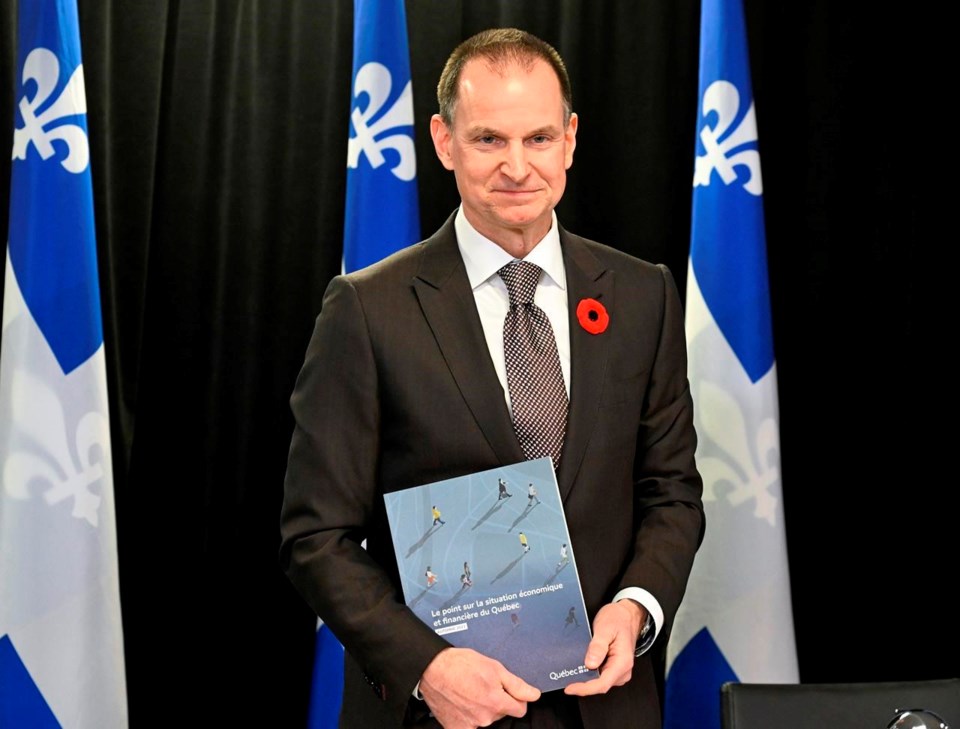Quebec Finance Minister Eric Girard has cut his projections for the province's economic growth in 2024 and is warning that Canada has entered a period of economic "stagnation."
The next six months will be difficult due to high inflation and interest rates, Girard said Tuesday after releasing his economic update. To help Quebecers cope with the rising cost of living, the government is increasing certain tax credits and social benefits above the rate of inflation forecast for next year, he told a news conference in Quebec City.
"Inflation has come down but it's still high, interest rates went from zero to five per cent, we have two wars. It's very difficult right now," he said.
Tax credits and certain government benefits will rise by 5.08 per cent starting Jan. 1, 2024, nearly double the 2.71-per-cent inflation rate he forecasts for the coming year. The government predicts that the annual inflation rate will clock in at 4.63 per cent for 2023.
Quebec's economy shrunk by 0.5 per cent in the second quarter of 2023, but Girard said he doesn't expect a recession — usually defined as two consecutive quarters of negative growth — and maintained his economic growth forecast for the year at 0.6 per cent. However, he said he cut his growth forecast for 2024 — to 0.7 per cent from the 1.4 per cent he had estimated in his March budget.
The situation isn't better in the rest of the country. Data for the Canadian economy shows that in the seven-month period ending Sept. 30, there were six months without growth or with economic contractions.
Girard said indicators such as the labour market, consumer confidence and production of goods and services remain stronger than would be expected if the economy were in recession.
"We're not witnessing the behaviour that's associated with a recession, but we're also not witnessing growth," he said, adding that he describes the situation as economic "stagnation."
His update says Quebec government revenues will be around $144.3 billion for the current fiscal year — around $800 million less than forecast in the spring budget; spending will be around $147.4 billion, approximately $600 million more than forecast.
Quebec's operating deficit will be just over $3 billion — up from an estimated deficit of $1.67 billion in the spring budget. That will rise to more than $6.1 billion after the government makes payments to a fund dedicated to reducing the province's long-term debt.
Girard has maintained his plan to balance the books by the 2025-26 fiscal year. But when the legally required payments to the debt fund are considered, the budget won't be balanced until the 2027-28 fiscal year.
The Opposition Liberals accused the Coalition Avenir Québec of spending itself into a corner with measures like direct payments given to the majority of Quebec residents last year.
The economic update includes $1.8 billion over five years to build 8,000 social and affordable housing units, the cost for half of which will be paid by the federal government. Girard said 500 of those units will be for people who are homeless.
Also in the update is $124 million over five years to fight the rise in homelessness, as well as $21 million in 2023-2024 for food banks and other food security programs, such as school breakfasts.
There will also be $400 million over five years related to the historic forest fires last summer. The money includes funding for reforestation, affected communities, the forestry industry and the province's forest fire fighting service.
Girard delivered his update one day after public sector workers, including in the education and health and social services sectors, walked off the job for several hours — the first walkout in a series of scheduled strikes.
He said the government's latest offer — a roughly 10.3-per-cent salary increase over five years, along with a one-time $1,000 payment and further increases for some workers — fits within the budget. But any additional spending on public sector workers, he warned, "will require borrowing."
But unions representing government workers say that's the result of political choices, including a tax cut last year and $1.3 billion in the economic update to renew an investment and innovation tax credit for businesses. "The government is therefore in no position to talk about the limits of its ability to pay," Éric Gingras, the president of union federation the Centrale des syndicats du Québec, said in a news release.
This report by The Canadian Press was first published Nov. 7, 2023.
— By Jacob Serebrin in Montreal.
The Canadian Press



